#and they wanted to have consequences for players doing the “evil path”
Text
You know, one of the most interesting thing about BG3 to me is that all the different choices and RP moments you can make mean that it's very easy to have a multitude of playthroughs that don't neatly fall into the boxes of "good" or "evil" runs.
The other interesting thing is that whenever Larian talks about their game, it feels like this was a complete accident.
#bg3#the “true good” path has more content than any other path#because Larian did not expect a worldstate where the tieflings were dead for any other reason then because the player murdered them#and they wanted to have consequences for players doing the “evil path”#which is also just. maybe the consequence should be anything besides having less content to playthrough#but they did THAT bc they assumed people would mostly be doing evil playthroughs for their 2nd or 3rd run when they'd be tired of sidequest#Larian writes Ascended Astarion's romance a very specific way because the writer assumed people who romanced him on that path#only cared about the sex and power#so your tav/durge gets pigeonholed into a very specific personality#and these are only the things I know for sure bc they've been outright stated in interviews or tweets from writers#i know they can't account for every playstyle#but I never felt this way playing a bioware game#the whole 'oh I clearly am not meant to rp or play this way' feeling#im caught between being glad to have more rp choices but wondering if its worth it when i get punished for taking them
10 notes
·
View notes
Text
Dark Urge and Astarion romance (spoilers for both quests)
So I have a lot of feelings about the Astarion romance route while playing Dark Urge. A LOT. I feel like the two (and in general Shadowheart's personal quest too actually) feel very complementary.
TW for everything involving Astarion's past, and general violence.
Keep in mind that this is going to be a long post and it is going to have SPOILERS for the whole game, till the very end. In general this is a long happy rant about how happy I am about Dark Urge path and Astarion romance together. Also keep in mind that this is about my feelings of the two, not about "which one is objectively the best romance for Dark Urge". This is more of a "please if you liked astarion romance as tav romance him as dark urge too" than a "if you play as dark urge you need to romance astarion".
Also keep in mind this is ONLY about redeeming Dark Urge and their good path! In the post I will only talk a little bit about the bad ending.
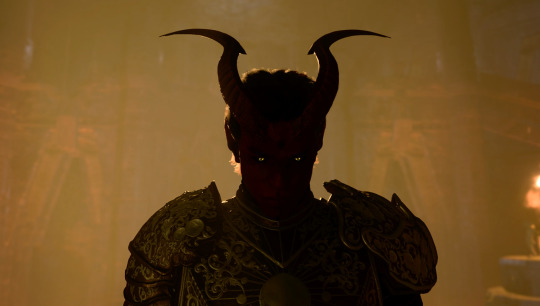

General points
In general, I just wanted to talk about the theme of the urges/hunger, the theme of family and escaping from your family, a little bit about the evil choice and the whole theme of rebirth that both characters have quite explicitly. In this order!
Urges
The first point of connection between the two characters is the fact that they are (sometimes) both driven by a certain hunger for blood or violence. As Durge you will be able to see how your companions react to these black outs, and you will worry about it, and Astarion seems to be among the most accepting. Maybe it is just his need to keep on Durge's good side, or maybe it is just the fact that he has experience on it.
In later scenes, Astarion will draw parallels between Durge's experience and his own. If Durge is cursed to succumb to his own urges, then Astarion will directly connect that to the times Cazador's has driven him feral and mad with hunger.
During the extra Durge specific romance scene, Astarion makes another direct connection to the violence in Durge and what he previously did. He does not have a completely clean conscience (that is clear, and not just because of Cazador), and he is not as "good" at making the good nice choice as other companions.
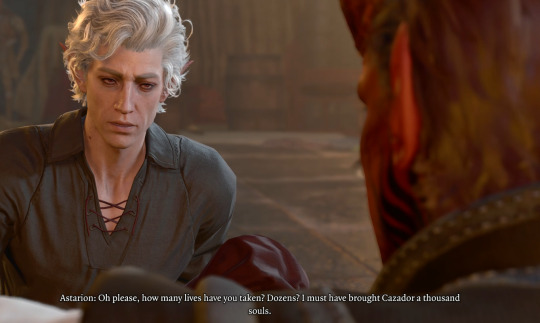
He understands the hunger and losing control over his body more than others, so he can empathize with Durge and what they are going through. He jokes about it, sure, but he is genuinelly worried.
Another option in the dialogue has him saying "If anyone understands an internal voice forcing your hand, I do. But that's not who we are now. We make our own choices, and you made the right one last night." He is the only companion who uses the "we".
Other points of overlapping are, of course, the fact that both characters have gaps in their memories. Astarion because of trauma and Durge because of physical trauma (torture and well, violence). Their past is one of violence, for both of them, and while Durge operated it a little more voluntarily than Astarion, this NEW Durge, the blank state we get at the start of the game... well, in a good playthrough they try to resist their need for violence just like Astarion is resisting his hunger and his thirst for power.
Reciprocal saving
Astarion is literally introduced as a damsel in distress. He is the only companion whose quest NEEDS to be completed before the tadpole is removed or he will become a slave again (other companions might have other consequences, but nothing that cannot be solved after the tadpole removal, and in case of Karlach there is no limit, she is destined to die or return to Avernus). He does need help, he cannot face Cazador alone, so we all know his plan for protection.
The first scene he appears him is literally him asking for help to try and lure the player and get some answers out of them.
As a player with companions characters, we are all used to helping them in their quests. But as I said, Astarion's help is kinda on a ticking clock based on the end of the game... and well, he is the one who is clearly less involved with abilities and fighting. In story, he is the only one who is out of place. Gale is a great wizard and Mystra ordered him to take care of the brain, Wyll is a legendary hero, Karlach is a legendary warrior, Shadowheart is on a mission for Shar, Lae'zel is also a warrior and she will be on her mission for Orpheus soon, Halsin is a powerful druid who wants to break a curse directly connected to the brain etc. etc.
Astarion is... a guy. Who was a slave. By accident he has been chosen by the mindflayers and freed. His only connection with the group is the tadpole, he could not care less about, well, the "mission". His own mission is remaining free and getting rid of Cazador. And he needs the player character for that (we know he is recaptured if he leaves the group).
I could go on a rant about the angst of it all and the power imbalance this create and the fear that surely drives him through act 1, but for now I wanted to talk about this "be saved by the player character" and how with Durge it finally becomes reciprocal.
This is more than "let's help each other on a quest". This is two characters who are on a path of possible evilness and destruction, promising to save each other.
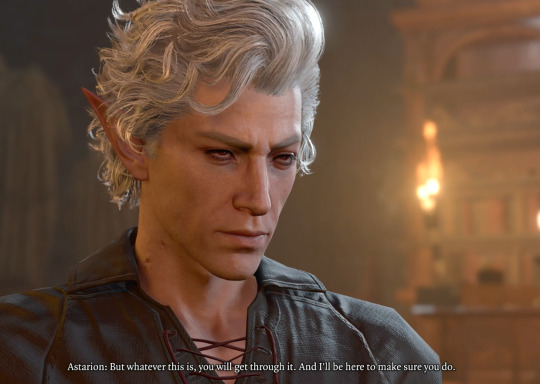
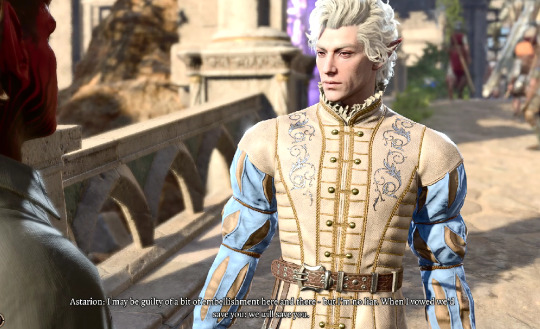
I think some of the imbalance in a Tav's playthrough, where Tav is good and helps Astarion out of their good heart, disappears in a Durge one.
Durge NEEDS Astarion as much as Astarion needs him. Astarion directly promises Durge to save them from becoming a slave to their urges. One of my favourite options as Durge is replying "I will be the person you want to see in me". Because for ALL the complaining, all the times Astarion says he wants power... the person he wants to see in Durge is still someone sweet and kind, a good heart.
You have two possible bad people who end up being each other moral compass and saviors, equally. And I think it makes the story so much richer. Of course, in the case of Astarion it is a direct persuasion check from the player (as long as you make him face the consequences), in the case of Durge is more metagaming, given it is the idea of wanting to be the person Astarion sees in you (and your friends and companions).
Both Astarion and Durge need to be seen for the good parts they have in them.
After the Durge questline, when they refuse Bhaal, Astarion will say "But somehow by your side I still only ever saw you", which echos what he says to Durge (in his romance scene) that he feels seen by them.
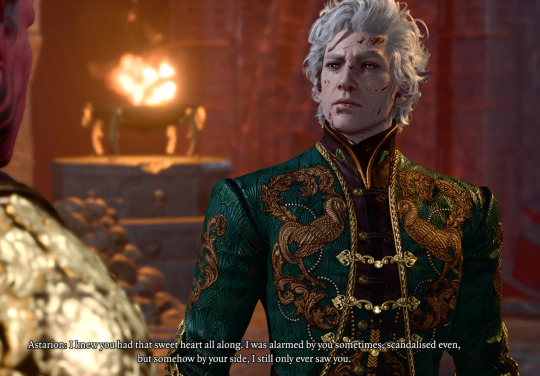
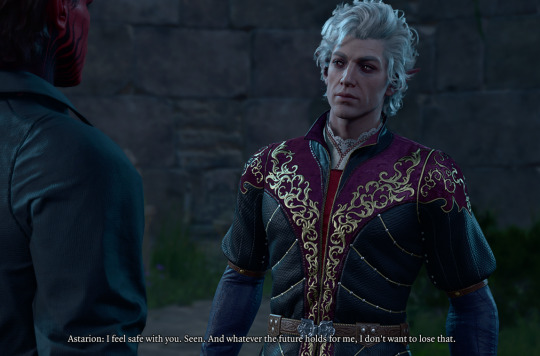
Family
For all the violence and the horror, the quests of Durge and Cazador are presented as family. Durge's family was what led them to violence, their father basically cursing them to a life of hate, then they were betrayed by their "sister" and made into a blank state.
Cazador constantly swings between considering his spawns as children or pets/dogs, putting himself in the role of the almost father. The spawns call each other siblings.
While the two families are quite different, they both end up with Astarion and Durge having to make a choice about choosing or refusing the "father"'s power, one to be stolen and the other offered.
You were also both made by them. Cazador often remarks on Astarion being his and being made/his creation. Bhaal directly considers Durge a puppet he made, and if Durge does not agree with his plan then he will make another.
The evil choice
I found it pretty interesting that there is only one quest among companions that have a full on evil choice, and that is Astarion's. Shadowheart's two choices are both painful and very hard to decide upon, Gale's choice of giving back the crown is seen generally as a good choice but it also involves giving back to Mystra who abused her power on him. Karlach, Minsc and Jaheira don'r really have choices. Lae'zel's choice of queen vs Orpheus is a clear path to Orpheus (as in, I think she decides that on her own if she sees him) but the real choice happens at the end, where she has to choose between Orpheus and living for herself - what is the good choice there? Helping free her people or live her own life? Wyll's choice is also hard and almost equal in pain/gain, one is saving his father and being stuck in the pact, and the other is freeing him but knowing Mizora will come for his father again (even if you save him in game). I think it is telling that the choice is hard because Wyll never says he regrets making the pact in the first place, it was a hard choice he had to make.
Astarion and Durge are the only personal quests that have a clear and defined evil ending, and interestingly enough it is similar...
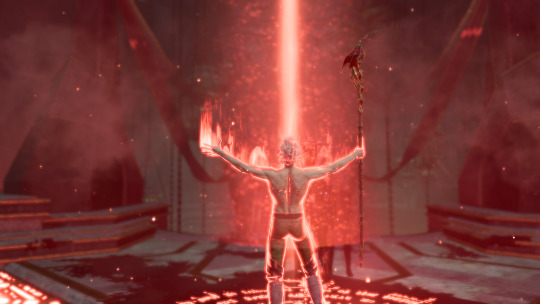
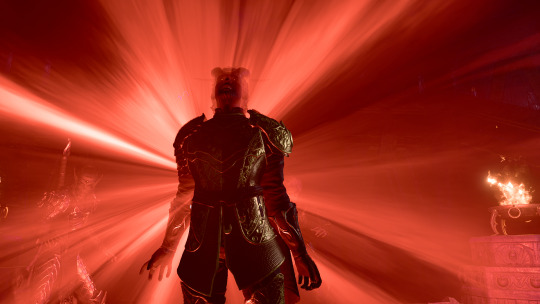
Both glowing in red light while accepting the cursed power given by their "fathers". Both will come out of it with glowing eyes and evil smiles. The bad choice makes them the worst version of each other, as they both failed to be anchor for their good selves.
I really dislike ascended Astarion, and he clearly has a bigger impact on his personality, given Durge is a player character, but I still found it a good parallel, just the fact that these are the two in the party who can be REALLY evil, who can truly go towards the worst possible path. And not a path of "evil together", but a path of domination and reciprocal destruction.
Astarion becomes everything Cazador's was and wants to take control of Durge, and Durge has to follow Bhaal's plan and take control of the brain... which ends up with Astarion just where he started, as a puppet controlled by that person who (as the Butler once said) he should have feared the most.
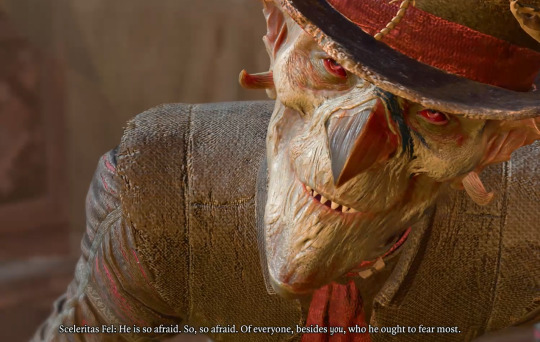
Rebirth (the good choice)
NOW TO TALK ABOUT MY FAVORITE POINT. Both stories, both quests, end in an explicit rebirth symbolism.
We have Durge literally dying, and being resurrected by another god of death, coming back to life to find out that he has been given a second chance. The urges have gone, they are free, they are a new person forged by the experience they went through during the path to Baldur's Gate.
In the same way, Astarion is also forged by his experiences with the group and Durge, by what they all went through. So much that if the player does not allow him to confront Sebastian and show him that he is driven by fear, that he, deep down, feels compassion for the spawns... then the player will lose the ability to persuade him to stop the ritual.
Astarion is also reborn, so much that we have a whole scene where he writes a new date on his tomb, it cannot be more explicit than this.
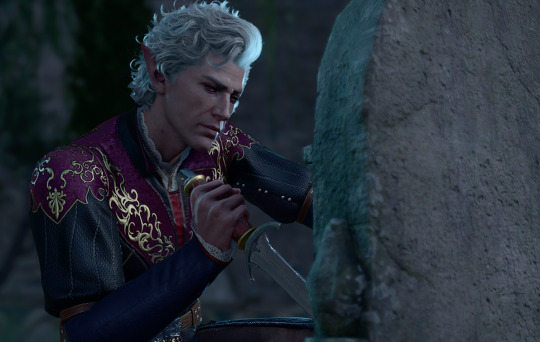
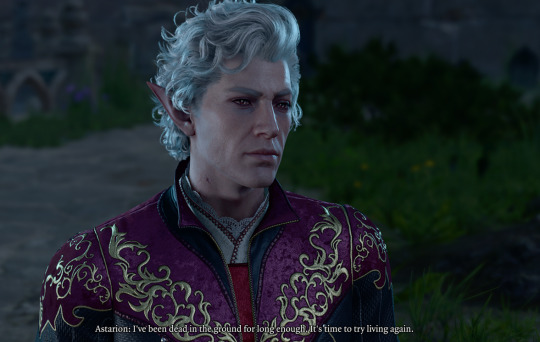
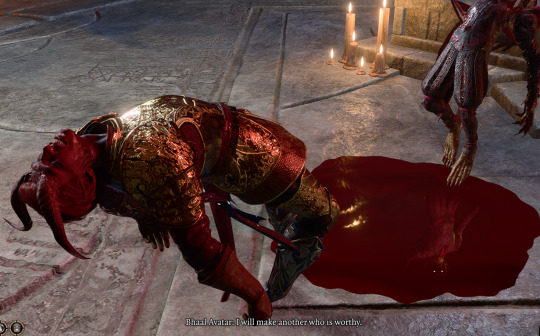
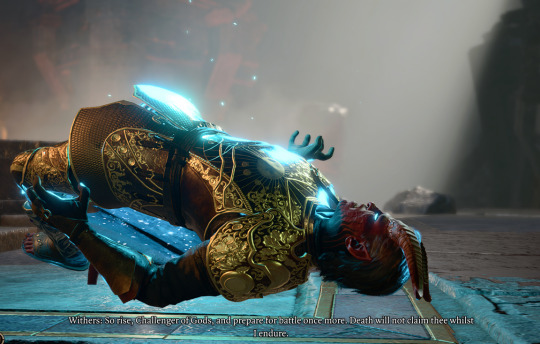
In both cases not only the theme of rebirth but of responsibility is stressed. Astarion talks about freedom as a place where he (and his siblings) are responsible for their choices, good or bad. And the same can be said about Durge.
So yes, I think playing as Durge puts so much more into Astarion's romance, because creates an almost parallel path of these two people who could easily become the worst version of themselves, and if Durge pushes to stop their urges, in a good playthrough, they do become each other's anchor and key to break the cycle.
#astarion#meta#dark urge#baldur's gate 3#astarion ancunin#astarion romance#durge#spoilers#durge spoilers#bg3 spoilers
863 notes
·
View notes
Note
inFamous' karma system is simply binary and way too rigid to be compelling. "Oh you think bullies should be opposed? Then you're on the babykilling spectrum"
And the gameplay needs to be reworked and expanded tremendously to have incorporate a multifaceted Karma system, which is simply too much effort that neither Sony or SuckerPunch seem to be interested in spending
I think for the time period the early games were released in it was novel and mostly well done but I think if the series wants to survive a modern revival then, PERSONALLY, my hope would be to go the route of the immersive sim genre (or even like, Undertale for a weirder example haha) and leave narrative consequences purely up to gameplay choices rather than dedicated Karma Moments. You lose some of the immediate presentational satisfaction and flare yes, but I think it would be so much more interesting if players like didn’t even fully realize just how much their choices were affecting their story experience until it’s far too late. I think this way you also get rid of the weird situation where in inFAMOUS you really don’t make hero or villain choices as you play the game. Technically you do, but like… how many people are playing half the game making hero choices and then suddenly deciding “uh wait actually i’m gonna sacrifice this civilian so i don’t hallucinate for a bit”. Like, you only really hear about “Good playthroughs” or “Evil playthroughs” and nothing more nuanced because there are legitimate gameplay and power progression reasons to stick to a single karmic path through the whole game. Upgrades are locked behind karma levels of either disposition. It would be a LOT more work and at higher risk of missing the mark to go for a more hidden, nuanced approach yes. But man, if you could pull it off you would have something REALLY special by the end of it I think.
197 notes
·
View notes
Text
Ascended Astarion Appreciation Post
I'm not going to do a true analysis here because I feel like all the individual lines of spawn/ascended/neutral Astartion and how broad the interpretations of them can be depending on the context of your playthrough have already been discussed ad nauseam by the fandom. The stellar voice work only adds to the ability for a player to feel a connection with whatever narrative they like best. However, I want to throw my personal experience with his storyline into the ring because I feel it's rather unusual.
For my style of play, I initially only brought Astarion along on my 'clever evil' run. I had no knowledge of his storyline before I started and didn't do any metagaming to win his approval; I just brought him along because the 2 minutes I saw of him in my main run made him seem like a good fit for a Tav with selfish choices. This was a custom bard playthrough where I made everyone love me by being a great con artist, killed the few who might make my rise to power more difficult (like the Nightsong), and lightly manipulated our companions into giving me their protection while I only took on minor risk. Naturally, Astarion played well with this character. He was entertained by having a partner to 'play' with, one who didn't get put off by cruel comments or his lust for power and was good at pretending to be manipulated by the questionably charismatic vampire.
I expected the power lust and loss of humanity toward the end of his story. What I did not expect was that by doing an Ascended playthrough first, I would ruin my desire to reload for the Spawn ending later. After all, aren't you supposed to want to do the "Good" thing when your default gameplay style is Good-aligned?
What solidified it for me were two things. First, his response to the Gur. His reaction suggested to me that he was probably a power-hungry noble before he was turned, one who paid the consequences for his cruelty, jumped at the chance for an escape through Cazador when faced with the consequences of that cruelty, and then spent the next 200 years being tortured horrifically for it. From everything I gleaned through his half-retelling, his story was much like the victims of hags or devils. I felt bad for the disproportionate horror of his fate, but there was an odd sort of justice in it as well, one that had long descended into pure evil thanks to the creature he fell victim to.
The second thing that turned me from doing a full playthrough just to see the Spawn ending was, oddly enough, the confession where he explains he's been manipulating you and has accidentally developed feelings. Now, this is partly because I may have accidentally skipped part of the animation, but when I decided to reciprocate the 'heartfelt feelings' as part of my character's manipulation, his answering smirk seemed to say, "Gotcha. So all I have to do is act vulnerable, weak, and like I would be nicer if someone just loved me for once in my life, and they'll protect me forever. I can do that."
After that point, I could never take any statement he made about redemption seriously, especially not if he was particularly blunt about it. The nail-on-the-head speeches I'd seen from him on the spawn path seemed exactly that - too perfect. Like it was exactly what a good character would want to hear, and something a rather poor manipulator but one who specializes in making people feel loved (which Astarion is) would fall back on. That's not to say the words don't ring with truth - they really do thanks to the beautiful voice work - but in the context of his relationship with power and dependence, every word felt like falling back on old habits to manage his fears. Ones he may not even be aware of, truthfully.
Do I think that was the intent by the writers? Absolutely not. But the more I pressed on in the story and he never reverted to that overly sweet act after he realized my character was actually more interested in giggling with him over how to obtain absolute power, the more it felt like the whole 'poor victim' act, although absolutely rooted in some truth, was truly an act to him.
He was terrified, would always be terrified, and had no problem doing whatever he needed to do in order to keep that terror at bay. His desperation made him easy to manipulate. He begged for both the tadpole's powers and Raphael's deal, staying true to a character that would always take the risk as long as it didn't threaten his vanity like the astral tadpole did. He was clearly incapable of forming a healthy relationship with anyone and had no interest in actually working on himself. Still, he was a master at adjusting his behaviors just enough to make himself safer in his new 'goodish' environment by acting like he had come to appreciate goodness. Not that he was ever completely heartless, even on a selfish/evil run, but it became clear that he mostly wanted goodness for himself. He didn't want a lack of chains in the world. He wanted to be the one holding them.
Ascending him was the obvious choice in an evil run. I would both be giving him the one thing he truly wanted and putting him forever in my debt...at least until his annoyance at having a debt outweighed his fear of being alone.
Becoming his spawn, on the other hand, was a hard choice. And probably the most satisfying narrative choice I made in all my playthroughs, good or evil.
For context, I had refused to use any tadpole powers in this run, giving it to him instead, so he could deal with the risk while being pleased by being handed more power. I didn't want to sacrifice anything personally while I was busy putting everyone in my debt. But here I was faced with a dilemma - did I have confidence that my character could still manipulate this vampire driven by fear enough to take the world if I let him turn me into a spawn so I could be immortal? Would the good and evil armies I'd raised to my name be enough to stop Astarion if he started to lose his utter devotion to me and made me a mindless thrall? If I said no or suddenly cast doubt on him, he'd certainly be enraged, given my prior support of him and his fear of rejection. Was the danger of angering him on top of losing that ascended vampire power worth my mortal freedoms? How long would that freedom even last if I said no, assuming he truly did end up exactly like Cazador, who would likely have just taken it from me in a rage?
Interestingly, this choice was made for me by the insight check that some people hate so much. When I saw he thought my character was still above him, that I had to degrade myself to be with him, I realized the man's leash hadn't gone anywhere. I could use him to get me the world. Yes, he would continue trying to manipulate me with empty promises, but I would continue manipulating him in turn by appealing to his petty vanity and insecurities. And together, we could have everything he ever lusted after with the only cost being a soul he was more than willing to lose.
I think the perfect cap to this was the ending. A romanced Ascended Astarion's ending was easily the most satisfying ending part of all the little character moments of all my playthroughs. The evil power fantasy was perfect. With the choices I made, it implied he was 100% as much my thrall as I was his (less literally in his case), leaving the corruption of his character beyond pure power lust open to interpretation. Add to that the satisfaction of his new unique dialogs near that end, and I was blown away. His confidence, for once, did not seem fake, though it was still informed by the fears that had driven him from the beginning. It was not his most healed or kind self (and how could he be either of those in any ending after 200 years of torture unless he was lying?), but his most free self, enjoying everything he ever wanted in a blaze of glory, relishing in his control, and fully giving himself to the newfound passions given by his second life.
Is he evil, selfish, and controlling? Absolutely. Will some hero inevitably take him out down the line when he gets a little too crazy with his powers? Probably. But such is the beauty and fun of the evil power fantasy.
It's unfortunate that playing this route, I can't enjoy how he is chained by the spawn route. I can understand what it is trying to do. Promoting the power of forgiveness, love, and support to allow someone to be their best self. It aims to apply human healing patterns to a supernatural creature in a cathartic way, one that has been successful for a great many people. But for me, it just doesn't land.
On runs where I care about his fate on a personal level, I hate to see him forced into a life where he loses all the things that have brought him joy, either now or when his lover dies. I don't want my choices 'for his own good' to mandate he forever sacrifices his own wants and needs. I hate how he tells you that you made the right choice after things have calmed down if you refuse to help him because what other option does he have? You've stripped him of hope outside of your protection. Without a cure, he's helpless at the feet of the Good heroes surrounding him who could end him in an instant if he's anything other than grateful and fawning for how much you've saved him. After the other route, that fate feels like dying a second slow death for a character so desperate for freedom and power, no matter how self-destructive it is. And since he basically says you did the 'right thing' when you have a high relationship no matter what end you choose with him, Good or Evil or in-between, it loses its power to me as a narrative anchor to any feel-good moments.
Personally, I like Astarion most as a character who is able to fulfill his base desires, ugliness and all. I think he's written in a way where he's well-suited to be both a victim and an awful person. I like the unique narrative of him being someone who is a bit of a monster and most fulfilled by being his worst self rather than seeking redemption, but appreciate that most people feel more fulfilled by a route where he's humanized and gets to heal through romance or a supportive friend.
I encourage everyone to find their own favorite variation of him. To me, he is one of the messiest characters who can have wildly different 'truths' depending on the context of your playthrough and your interpretations of his lines. Since he's a known liar and manipulator (and an unfathomably old one at that by human standards), there are a million and one different headcanons you can use to fill in the blanks on what he really means, who he really is, and what he really wants or needs.
I hope everyone out there enjoys whatever version of Astarion they like best. For me, I think I just might have to try a different variation on an evil playthrough. I want to see what other contexts I can get for his Ascension story and whether any of them hit as many satisfying narrative notes as my first.
59 notes
·
View notes
Note
Hey different anon here, i always thought floweys actions in the canon was supposed to be a kind of dark reflection of the players own actions, and a parallel with how WE treat video games. I never really thought it had anything to do with trauma, cause like think about it, how many players abuse save states in video games to get away with evil shit? Most of them i would wager, and if you had the power to save, load, and reset, maybe you WOULD start to treat even your own reality like a video game.
Like, is it wrong when flowey does these things when we do the same? Because to him its real but to us its just a game or is it ok for him to do so because it really IS a game.
And flowey DID say he also spared everyone, in the same sentence he said he killed everyone, implying both are things he doesnt really place value in doing, he didnt do it for fun, he did it because he got bored, and we do the exact same things in video games when we play one a bunch, we start to experiment, we start seeing how different "npcs" react to different situations, we start making challenges for ourselves, we start analyzing characters and putting way more thought into their actions then the person who wrote them probably did.
When flowey has that power taken away from him, only then does he start to change from this desensitizing and feel intense emotion like rage when you don't do what he wants, or fear when you're about to kill him, both are caused by him not being used to not being in control, he spent so long being the one who gets to "play" the world that he can't accept a world he's not the "player" in.
Another factor might be that not having a soul inhibits his ability to feel empathy, but thats just headcanon, sorry for this long tangent, i just really like flowey, favorite character in undertale, just wanted to express my thoughts since everyones talking about him.
I think from a metatextual level, Flowey 100% is meant to be a dark mirror of the player, which is likely why his full backstory is only given in geno, since at that point you're treading a similar path as him if you go all the way on that route.
That being said, I don't think there's a lack of trauma. At the end of the day, the buttercup plan involved watching his best friend/sibling die, said sibling sharing control of his transformed body (which is implied to be VERY unsettling in appearance), his refusal to take a single SOUL, which led to his death, and then awakening in a new form, unable to connect to others the way he used to and assuming he was broken as a result of it. He did try to take his own life, after all, and only came back from it because he got scared and his determination brought him back.
His power allowed him to avoid consequences and grow detached, of course, but there is absolutely room to read trauma as a PART of how he got to be this way. Not the sole factor, but a pretty significant one, especially if you interpret his loss of compassion as an undiagnosed PTSD symptom misunderstood due to toxic positivity culture among monsters. e.g. this idea that their souls are made of love, hope, and compassion and that makes them different/better than humans.
Considering how many monsters force smiles to deal with their pain, I legit this mindset is super harmful to all monsters and they might not even realize it.
Flowey is a great and complex character, and losing his abilities definitely also impacted his actions, for sure. I definitely am not a fan of the immense woobification of Asriel in the fandom, like, at all, and it's part of why this arc in IF is taking its time to do more character exploration and stuff since in UT, a lot of his depth is locked behind a route the game actively doesn't want you playing.
88 notes
·
View notes
Text
One of the worldbuilding choices I made almost by accident in my D&D campaign setting is the relationship between mortality, personal growth, and alignment.
Long rumination on this below the cut.
Basically, while I don't use alignment for player characters and most NPCs, I do use it for cosmic beings like celestials, fiends, and fey. This is what separates mortals from the divine; these immortal powers cannot be anything but what they are. Mortals have the capacity to grow and change.
Lately I've been thinking a lot about Agos the Endless, the Archangel of War. He's interacted a bit with the Conquest paladin in my party, Reginald.
Agos has been treating Reginald extremely harshly for some (admittedly despicable) past actions, though Reginald is on a path to self improvement. As Agos explained, Reginald's paladin abilities are not a mark of forgiveness, they are a punishment. Agos is wielding Reginald like a weapon against the BBEG, and that's all he is to Agos. A tool. Something to be deployed towards an end until it breaks.
See, Agos is furious because Reginald didn't have to kill the five innocent people he did in his backstory. Reginald had a choice, and he chose to forever take choice away from others.
Agos never had a choice.
Now, Agos always does what he wants to do, what he feels is right, so in that sense he's always making choices.
But his choices will always be the same. He can't grow. He can't become wiser or more patient or more forgiving. He can learn, and apply what he knows, but he can't internalize lessons.
And Agos KNOWS this. All the cosmic beings do, but he's one of very few that resent it. He's trapped in a prison made of his very being, and to escape it would be to destroy himself.
Imagine that. Think back on a choice you regret. Something that was foolish or selfish or immature, something you wouldn't do now if you found yourself in the same situation. You're a different person than you were then.
Now imagine not being able to change. Knowing that years from now, you'll still act on the exact same impulses that drove you to do something you now regret. Imagine never being able to improve yourself.
Agos is resentful of Reginald, as well as many other mortals, because Reginald has what Agos could never have, and he squandered it. He didn't have to kill those people, but he did. Agos refuses to see Reginald's growth because to do so would be to confront his own deficiency in that area. He wants to condemn Reginald to a life of pure utility, to deny him glory and legacy, because he wants someone else to feel what its like to be unable to outgrow one's mistakes.
It happened mostly on accident, but Agos became such a tragic figure to me. He's a giant mountain of scars with wings like sharpened steel, the embodiment of violence, and that's all he can ever be. He's trapped in an endless war against the forces of evil, and he's never going to become wise enough to tip the scales in favor of heaven. He's never going to become better or stronger or even come to be at peace with it because all those things require real change, which would defy his very nature.
There are ways he could change, shift his alignment. The consequences would echo across reality and he would be fundamentally changed at every level, but it is possible. But that new state wouldn't change either. What's worse, he'll never do it, because if he was capable of overcoming that fear he would have done it already.
I dunno. Just thoughts about this poor diety of conquest, trying desperately to relieve some of the pain of his eternity.
#if anyone makes a “war never changes” joke im cleaving you in twain with my greatsword#worldbuilding#dnd#dnd5e#d&d#d&d 5th edition#old man sunbear rambles
15 notes
·
View notes
Text
Finally finished BG3, brief rambling under the cut -
Completely charmed by the dead smuggler sisters and that unexpected little 'they didn't deserve this' banter that triggers if you bring Droralias's teddy bear to her corpse - just the fact that there's absolutely nothing prompting you to do that in terms of quests or rewards, no one asked you to deliver her teddy bear to her, but the game devs knew if they put this teddy bear in the game then some of the players were going to do that and they wrote a little companion banter just for this ;_;
I'd gotten used to Tav's half-ilithid look over act three, so I was not prepared for the sheer relief when Tav got his face back at the end - I'm even more happy with the half-illithid path now, it makes for such a visible weight lifted, even more so than the destruction raining from the sky, proof that not just the general tadpoles but your specific tadpole is really dead, it's really over, just by having a before/after sequence -
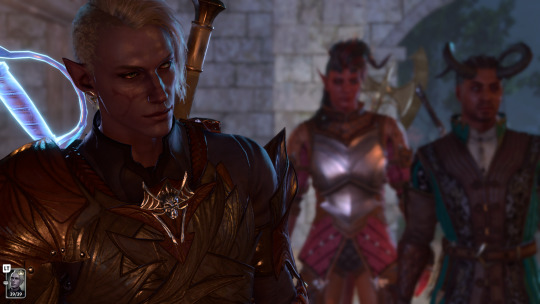
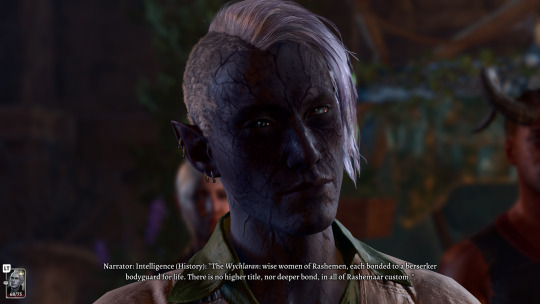
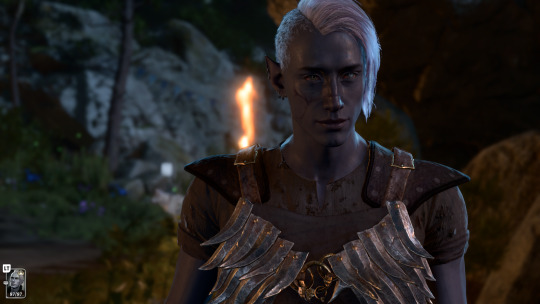
Ending the game by getting visibly healed!!
Also kind of pleasantly baffled that trusting the Emperor had no other negative consequences aside from that one semi-unwilling appearance change. I was really expecting him to push harder for Tav to go full mind flayer at the end, but there wasn't even a dice roll for it! Even after all these ominous hints about Stelmane, that clear warning not to trust him! He tells you he still has feelings even as a mind flayer, and then you go through his old letters and find his writing about not feeling his feelings anymore now that he's a mind flayer! (The whole backstory with Ansur was cute ;_;) Surely, I thought as I watched him suck Orpheus's brains out, this is going to come back to bite me when I get some kind of evil ending! And yet!! No, nothing. Thanks for the cool powers and tentacle sex and saving the world, dear sweet thrall master who spends the whole game leaching off a captive in this story that's all about freedom and the lack thereof.
I am also completely charmed by how everyone in the epilogue wants to catch up on Tav's epic friendship with Karlach over and above anything else, they are so glad Tav and Karlach have each other, Karlach's smiles brighten the skies of hell, this is the most important relationship to talk about here (romanced Wyll who has also spent the past six months in hell is standing right there, guys. He's the one who pleaded for Karlach to come with us!! I left the choice up to her!!) For a minute I thought there was a bug and I was getting Karlach romance dialogue, but no, some of them did specifically refer to it as friendship, Karlach is just that central to Tav's life. As is right.
18 notes
·
View notes
Text
re @mousebrass


[context]
Sorry for the delay, I just needed some time to simmer my answer.
(for frame of reference, I'm mostly referring to fallout 3 and fallout 4. not new vegas, and I don't know enough about FO76.)
When I said 'Bethesda's fallout will never say no to you', I meant in sort of a structural sense. The gameplay and the storytelling combine in Bethesda's fallout games to do nothing but affirm the player's forward motion.
They do this so well the storytelling is ONLY a function of the gameplay loop: a relay race that progresses with total blindness to what the player actually does so long as they hit the checkpoints that advance things along.
Forward motion is good, we need stories to progress and to get from one event to another, we don't want to run around in circles in a game achieving nothing. And we don't want to encounter a true dead end, or a frustrating 'sorry mario the princess is in another castle!' situation where we feel our prior actions were pointless.
BUT. Hear me out. Negativity, 'being told no', friction along the way, is important to an 'adventure' being more than just an endless gopher loop.
Lucy MacLean IS given objectives in her journey. But the narrative is not her personal facilitator; instead she can't proceed UNLESS she does these increasingly heinous uncomfortable things, okey dokey! She COULD choose not to do them, but she'd 'fail' or thinks she would. Her struggle 'drives the story' rather than styling her actions as intuitively synonymous with 'progress.'
In Bethesda Fallout games. It really doesn't matter what dialog options you choose, progress is inevitable. And blind. If you choose peaceful or guns-blazing approaches. Want to join the fascists? You won't encounter too much content that places pressure on you for doing that. Want to side with the scrappy underdogs? Done, it won't be that much of a strain on your resources. Take the evil option? Except for maybe a few NPCs that could desert you, you won't be constrained by that commitment very much.
It's 'the customer's always right', when that idiom exists basically to facilitate transactions and nothing else.
In fact, the one time in a Bethesda fallout game where meaningful pressure or negative consequences impacted you, in fallout 3, the ending was so unpopular it was retconned in a DLC. But it doesn't have to be this way; there are many times in New Vegas where you might feel conflict or constraints on your actions, a 'no' that makes what you actually choose to do feel more interesting. Like, enough times that I think anyone who's played it, could think of one (their favorite one?) right now. I don't even have to list examples, because the variety is great enough that different people can choose which one feels compelling to them.
Remember when I said we wanted to avoid scenarios where we feel futile, running around in circles, pointless, or obstructed? Well, after a while a lot of Bethesda games become that anyway even if they always take the player's side. People just... give up playing a save usually by level 30. Boundless affirmation towards forward motion, where all paths are THE path and you're the main character of reality, it sucks. it's why Lucy MacLean's wasteland experience will leave you wanting to play fallout and then sighing when you boot up the game that just got a 'remaster' and it's still mostly drudgery. When SHE hits 'quest objectives,' her world doesn't say 'yes! now go do...'
It says "oh, hell no. but you gotta... unless maybe..."
#fallout#belated reply#the bones of the quest chains and gameplay loops show too much in bethesda games#turning them into relay race fetch simulator instead of roleplaying games or even 'action/adventure' games#a constant forward motion is also cowardice and unwillingness to make the player navigate their own choices#if that is the case just... omit the choices. remove the 'roleplaying' element. actually put us on rails instead of pretending.#long post
9 notes
·
View notes
Text
Something that Baldur's Gate 3 does really well is make the characters behave like people. Like real actual people who can be stubborn and sometimes lie, to themselves and to the player, and have conflicting motivations and feelings. This is illustrated particularly well through pivotal moments in companion quests when you have the option to persuade/otherwise influence them.
I was initially inspired by the somehow enduring opinion of some that "it's wrong to persuade Astarion not to complete the ascension ritual" and wanted to explore that idea a little more, especially in contrast to other companions throughout the course of the game.
A. Lae'zel and the Zaith'isk (Act 1)
Anyone who has been to the Githyanki creche and had Lae'zel use the zaith'isk knows that the persuasion checks (all of the checks involved, tbh) are EXTREMELY difficult. We know going in that purification is Lae'zel's highest priority. She does NOT want to get out of the zaith'isk no matter how much it hurts. The first persuasion roll you get to try to convince her to leave the zaith'isk has a whopping DC 30. Alternatively, you can try to roll a DC 30 wisdom roll to show her via the parasite the consequences of remaining in the zaith'isk. I've never succeeded on either myself.
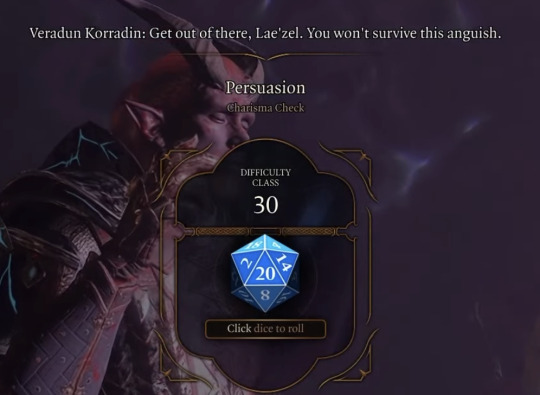
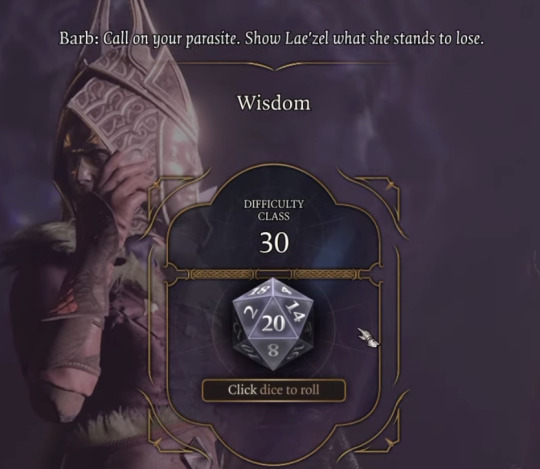
"Get out of there, Lae'zel. You won't survive this anguish"
"Call on your parasite. Show Lae'zel what she stands to lose."
If you fail either of these checks, Lae'zel begins to suffer adverse effects (permanent -2 to certain ability scores) that stack the longer she remains in the device. There are real, in game consequences due to your actions/failed rolls and Lae'zel's unquestioning loyalty to and inherent faith in Vlaakith.
After succeeding on DC 21 wisdom roll to discover that the zaith'isk in fact is not a means of curing the infected, but to kill them, you have the option to try to persuade Lae'zel again to leave the device but with a much lower DC of 21.
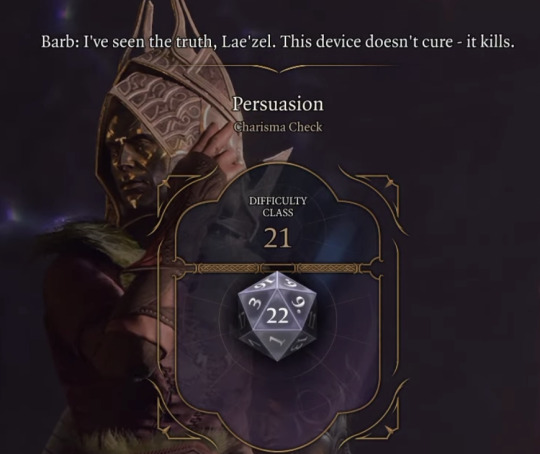
"I've seen the truth, Lae'zel. This device doesn't cure - it kills."
So what does this tell us? How does this help us to better understand Lae'zel? We already know that, out of all of our companions, Lae'zel is one of the least likely to lie. She prefers to be direct and efficient. She is unyielding both in her loyalty to the githyanki and to Vlaakith. To try to convince her that the zaith'isk, what Lae'zel refers to as her "right" and "Vlaakith's purity," is actually intended to kill her is a difficult task. So if you're looking for someone who actually doesn't want to do something and you're trying to persuade them otherwise...this is it! That's why the difficulty class of the rolls is so high!
But she can be convinced. Lae'zel is not immune to reason. This can be the first step Lae'zel takes in her journey to defying Vlaakith.
B. Shadowheart and the Nightsong (Act 2)
Shadowheart's confrontation with Aylin in the Shadowfell in Act 2 is one of the highlights of the game for me. There is a DC 30 persuasion check at the beginning of the scene to convince Shadowheart to spare Aylin. Again, not a roll I've ever succeeded on myself. And personally, I find the dialogue option "trust Shadowheart - do not interfere" much more narratively satisfying. After this, the paths diverge slightly.
If you chose to side with the Absolute cultists and raid the grove in Act 1, you have 2 dialogue options to persuade Shadowheart not to kill Aylin with fairly low DCs (I believe they are both 14). Take this with a grain of salt - I haven't verified this myself in game.

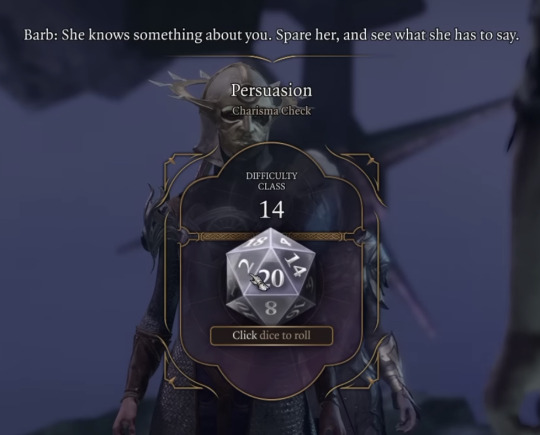
"She knows something about you. Spare her, see what she has to say."
If you chose to side with the grove and killed the Absolute cultists in Act 1, you have one persuasion option with a similar DC.
Then we get to my favorite part. To the best of my knowledge, no matter what "evil" or "good" choices you made previously, if you choose to let Shadowheart make her own decision here, she chooses to toss the spear into the shadowfell's depths. She spares Aylin and defies Shar.
This tell us A LOT. Up to this point, Shadowheart has spent much of her dialogue telling the player about her faith and dedication to Shar. She tells us that she wants nothing more than to become a Dark Justiciar. So why, when given the chance to make her own decision by someone she trusts, does she choose to defy Shar? To lose her chance to become a Dark Justiciar? Why would the player need to direct Shadowheart to do something she's told us is all she's ever wanted?
I would argue that, as we see when you allow Shadowheart to decide on her own, it's because she doesn't really want to kill Aylin. I believe that she believes she wanted nothing more than to become a Dark Justiciar, but did that dream originate with her? I find it more likely that it was due to her religious indoctrination, as well as a result of the trauma she endured at the hands of Viconia. The Mother Superior often punished Shadowheart for failing to live up to her expectations, the expectations of Shar. Becoming a Dark Justiciar would prove that she belonged. But as we learn later, she never really belonged. When given the choice, Shadowheart stays true to her own nature rather than trying to appease Shar.
C. Astarion and the Rite of Profane Ascension (Act 3)
A lot has been written about Astarion and his personal quest, understandably so. For this post, I'm going to focus specifically on the persuasion checks you can make after defeating Cazador in battle in Act 3.
The claim I've seen several times is that it's "wrong" to persuade Astarion not to ascend because you have to make a persuasion check to do so which is....an interesting take. Persuasion dialogue options aren't inherently bad or manipulative, they're simply a game mechanic. That being said, let's take a look at the actual dialogue options.
Going in to this scene, we know that Astarion doesn't really want to kill the other spawn - his "siblings" or the spawn who have been captive in the chapel. His main goal is to kill Cazador. But he is tempted by the power he would gain if he completed the ritual in Cazador's stead, which would require sacrificing around 7,000 spawn. We also know that Astarion isn't a "details person" meaning he doesn't tend to think things through. Yes, he would gain power, but what would he lose? What other consequences would result from his decision?
Above all else, during his time as a vampire spawn, Astarion was taught that power keeps you safe. Specifically the power to manipulate and hurt others. The ritual promises power. But in his haste, Astarion risks repeating the cycle that began many many centuries ago, going back well before whoever turned Vellioth (Cazador's master).
First, you're presented with a DC 18 persuasion check that convinces Astarion not to complete the ritual if you're successful.
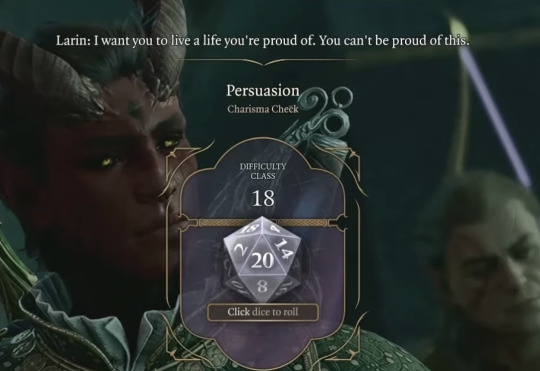
A high difficulty class, but compared to the DC 30 of Lae'zel's first zaith'isk checks? It's practically nothing. I personally prefer to take a different route, however.
In the same dialogue options, you can choose to make a DC 20 insight check to see why Astarion is still so adamant on performing the ritual - a more difficult check to be sure, but an illuminating one if you succeed. The narrator tells us that Astarion is afraid - he can't see past the power he might gain and "the freedom that power brings." He can't see the forest for the trees, or perhaps he can't see the potential consequences past his desire for (presumed) safety.
If you succeed on that insight check, you get the option to make a slightly easier persuasion check of DC 15. The DCs of skill checks and saving throws aren't arbitrary - the fact that convincing Astarion not to complete the ritual is easier than the checks discussed earlier gives us some insight into Astarion's mindset.
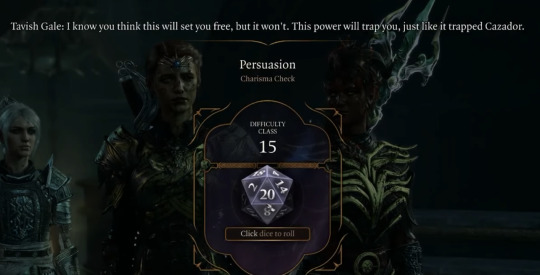
"I know you think this will set you free, but it won't. This power will trap you, just like it trapped Cazador."
This has never felt manipulative to me. To me, it comes across as the player pointing out to Astarion that power comes with a price, one that he might not be willing to pay, one that he might not be considering in the moment due to fear and desperation.
So what can we make of this? Given that spawn Astarion later thanks the player for, in his own words, saving him, he seems genuinely happy to not have gone through with the ritual. He also says that he almost lost everything, including himself. Astarion seems to realize, to some extent, that completing the ritual and killing all of those people would have changed him - costing him what really makes him him. His vulnerability, his silliness, his joy. By persuading Astarion not to ascend, you teach him that the power from the ritual (that "never having to fear anyone again") isn't worth the cost. That he is enough just the way he is.
Going into the fight with Cazador, Astarion is clearly of two minds. He desires the power offered by the ritual, but he also feels responsible for the fate of many of the people trapped in the crypt and doesn't truly wish them (further) harm. He is standing on a precipice, unsure of whether or not to stumble backwards into old habits and isolation or to leap into the terrifying unknown of freedom. Astarion has also spent 200 years unable to make choices for himself - and he is now presented with a huge choice that will affect thousands and change the course of his own life forever. Ultimately, it's up to the player, the influence your character has on him, that encourages him to either continue or break, as Astarion puts it, "the cycle of power and terror."
#baldur's gate#some meta analysis stuff that i wrote 2 months ago and have been sitting on#clearing out my drafts#i dotn even really want to tag this for fear of The Discourse but i also didnt want to just delete#so i am tossing it into the wild
15 notes
·
View notes
Text
Minthara fans being upset about how other people play their games is becoming irritating. Larian literally just patched in a glitch that they removed before, it wasn't like they changed her story. You are not blocked from recruiting her via murdering refugees.
It's funny to see people who say shit like "They're just pixels" when other players didn't want to murder a group of people who were blatantly marginalized and homeless for one companion at the consequence of losing potentially four, get upset when people cheese the game to recruit Minthara. Suddenly, you have to treat Minthara with utmost reverence.
"She was the only true evil companion." There is no set evil path in BG3. You can do heinous things with or without her, and recruiting her doesn't lock you into a bad run. Astarion, Lae'zel, and Shadowheart will stay with you even if you do commit horrible actions. AND once again, you can still side with her against the grove, Larian did not cut that from the game.
#baldur's gate#baldur's gate 3#bg3#baldurs gate#baldurs gate 3#baldur's gate iii#baldurs gate iii#larian studios#larian#up there with astarion for having the most annoying fans
12 notes
·
View notes
Note
on the topic of the “evil” path in bg3 being unsatisfying it’s like. I do sympathize w/ ppl who go that route and are unhappy w/ the amount of content lost….but at the same time I can’t help laughing bc it really feels like they want to be able to slaughter a bunch of refugees or whatever without suffering any major game-changing consequences. and maybe it’s mean of me to say this but tbh i feel like a genuinely evil pc would not gaf abt losing companions anyway, so idk why some players complain about it so much. that’s just kind of what happens when you’re a stab-happy maniac :/
I look at it two ways. From a game dev perspective, yeah, the “evil” route is unsatisfying because there is no considerable difference in content besides things lost. It would be interesting to have seen something fleshed out where you could actually ally with the Cult of the Absolute and make really self-serving decisions, etc etc. So, to that end, I get it.
From a meta or roleplaying perspective, though, I agree. This is a game about power and control, and those moments are sacrificing morality for an advantage over everyone else. You can’t be surprised if good people turn and walk or if people don’t want to help you because, well, they’re also playing their roles.
13 notes
·
View notes
Note
curious about your doto thoughts. i only played it once and reasonably enjoyed it (if anything, i had more issues w dh2) so im interested to read about your experience
sure thing!
first off i want to be absolutely clear that this rant is 100% petty. doto didn't, like, burn down my crops or (to my knowledge) influence any kind of shitty trend or real world harm. i don't have issues with gameplay, art etc which are ultimately bigger draws in the series. and the story was straightforward and mostly internally consistent, so ignoring the prior games, even that could be worse. but despite arkane claiming it worked as a standalone, much of the narrative's weight DOES rely on previous games. so i think it is fair to measure it up against previously established aspects of the series, and find it wanting.
when i saw promo material i thought the concept was... flawed. to be exact, i mean the idea of a) daud and billie going to b) kill the outsider because c) he's responsible for the awful shit in the world. any one or two of those points wouldn't have given me pause, but all three together seemed pretty contradictory to what we knew about the setting and the characters.
the outsider isn't responsible for the awful shit in the world. he just isn't. i do not think the previous games could possibly have emphasised this more. his direct actions are giving a handful of people magic powers and some hints, but what those are and how they are used (IF they are used) are shown to be completely reflective of the individuals both in story and gameplay. the average person in the empire is not affected by the existence of the marked at all. there is no evil magocracy. the closest thing, delilah's reign, is a takeover of the entrenched power structure and it can be defeated with the protagonist's own outsider-given abilities.
gangs, corruption, police states, religious control, wealth inequality, spreading of disease - these are the real issues that the citizens of dunwall and karnaca face daily, and they are completely independent of the outsider. time and time again we see that casting him as the source of society's ills is a hollow excuse for the perpetrators; it's exactly what the abbey does as it kidnaps children and murders "heretics". as a player, why would i think about killing the outsider when there are so many rotten institutions right there? it's even worse when dh2 portrays him as a historical murder victim himself, who seems to prefer it when people don't abuse their powers, even if he cynically expects they will.
and no one should know more about human choice than daud, post his dlcs. like, his entire character arc was realising that whatever the outsider gave him, he alone was responsible for his actions, so he must bear the consequences. it all comes down to his canonical low-chaos speech in dh1, after seeing corvo deliberately NOT slaughter his way through life: "you took a path i could have followed, but did not... you choose mercy. extraordinary." we are given every reason to believe his desire to retire peacefully is earnest and something he follows through on. the story's premise would be cheapened if he didn't.
as i see it, the key theme of dh1, its dlcs and dh2 is that, while privilege may blind and power may corrupt, there is always the choice to do better, and it is often the harder choice. and look, i think the doto writers may have been trying to expand on that. what about the root causes of privilege and power? who draws the lines? who can best try to take the system down, and what happens when they do? fair questions! but doto looks for the answers in all the wrong places, and so is at odds with the other games instead of in conversation with them.
it's kind of perfect that doto is so resolute in downplaying agency, really. if you're going to ignore the details of the stories you're building on, why not go the whole hog and make your message completely antithetical to theirs.
billie is the player character, but she is not in charge. she pretty much just goes along with whatever daud says, though she's not his young protegee anymore, and she had plenty of autonomy back when she was. there's so much focus on what daud's done and his mission and his angst about how he turned her into a killer and she's the one who has to carry out this job because he's dying etc. when they first reunite he asserts that he knew she'd come find him. because her life is supposed to revolve around him, i guess? ugh. a sprinkle of sentimentality is fine and even heartwarming, like the writers intended it to be, but to have it as The Story in this way just gives the impression that she's little more than an extension of him.
sure, you CAN technically question daud's idea of the outsider's culpability at the end, but 1) daud's dead and 2) the conversation goes straight back to whether the outsider should die for what it's asserted he's done. anyway, one argument in favour of saving him is "this wasn't his choice, he never asked for this power" lmao. it's just like how billie's void powers are forced on her (in an awfully uncharacteristic fashion by the outsider, i might add) and we're not supposed to worry too much about any carnage she causes with them.
the chaos system was one of the most interesting ways to deal with the violence = bad problem in violent video games. in doing away with it, doto pays lip service to the idea by having daud and billie wallow in guilt about their pasts, but there are no external consequences that might prompt actual introspection and a change in behaviour for them and the player. this means if you slaughter entire buildings of people, it's no biggie, nothing changes, never mind the fact that the story is trying to pose some ethical questions about murder. it also means daud is extremely annoying the whole way through. but hey - it's totally compatible with the theme that choices don't matter that much.
yet for something that's trying to be so different from its predecessors, i do think that doto relies a little heavily on nostalgia. if you aren't attached to the characters at the start, i doubt the game comes close to the emotional peaks it does otherwise. the narrated splashes aren't gonna do it alone - imagine if dh1's prologue didn't let you play with emily and simply told us that corvo looked after the empress' daughter - and there's not much character development throughout. i was definitely moved at times, i'm not going to pretend i wasn't! but often i felt it was despite the execution, not because of it.
also, "black-eyed bastard" was said way too much.
another issue was that i felt a lot of the script was written and delivered in a manner that wants to make you go "hmm, how thought-provoking", but the questions raised are never explored or answered meaningfully. even the ending is a stubbornly vague "i don't know..."
i got a little sad when i noticed just how often potentially meaty bits of dialogue were redirected. it made those moments come across as insincere and non-committal even if they sounded good on their own. as an example, mid-game billie asks "is the outsider to blame for what we did? does corruption come from the void or from our own hearts?" then keeps talking about her plans to kill him. if she'd instead reflected on who was responsible for her current actions, even if there was no firm conclusion, i could believe that the story was trying to have a genuine discussion about the blame game that we could learn something from. but it's not that deep :(
overall i just feel like doto tried to take Cool parts of dishonored without always considering all the details that made them Good.
a gruff assassin who has beef with god is a cool character, but he's a good character because of the specific arc he went through, and the version that shows up in doto is even less self aware than the one at the start of dh1; billie is cool because of her badass checkered past, but she is complex because her desire to be part of something bigger often conflicts with her independence and businesslike practicality, characteristics that doto doesn't really touch on; the outsider is cool as the powerful inhabitant of a supernatural dimension, but it's the distance from his devilish portrayal in the empire that makes him unique and interesting.
on a meta level, i've never seen anyone indicate a dislike of the outsider as a character, and to me the implications of his existence in the void is the most iconic part of the worldbuilding. killing OR removing him means arkane gives up the easiest, most sensible way to make a future dh game feel like Dishonored. it might never happen, but why close that particular door?* there was lots of speculation that the game was tying up the series for the forseeable future, which was probably true, but simply closing off the kaldwin era would have been enough for that. plus a smaller scope would also have been better for a small game. cosmic upheaval really deserves more gravity than doto was able to give.
what alternatives do i think might have worked? well, going back to the three points i mentioned earlier:
not centred on daud and billie, aim is still to kill the outsider who is believed to be responsible for everything - maybe a particularly zealous young overseer tries to actually do something about the outsider
centred on daud and billie, aim is not to kill the outsider, who is believed to be responsible for everything - maybe they can bring about the downfall of the abbey for good
centred on daud and billie, aim is to kill the outsider, who is not believed to be responsible for everything - maybe they have to reluctantly mercy kill the outsider for some void-related reason, or save him from someone else trying to assassinate him.
could work with any concept (i.e. i totally thought this would happen) - either billie or daud replaces the outsider in the void.
i did have issues with dh2 as well, and honestly they laid the groundwork for much of what i didn't like about doto. while i think the series always has fantastic incidental writing (whatever the collective word is for audiographs, journals etc.) the main stories have never been masterpieces, and dh2's attempt to lean more into character study wasn't super successful imo. to make some characters more sympathetic they sanded off some awesome unpleasant edges - why sokolov of all people got sad-dadified i'm still puzzled by. there's a lot more exposition. i preferred the more detached outsider from dh1. some references to dh1 and the dlcs were too fanservicey for my taste. but i think the biggest hint of things to come was the time travel mechanic - the focus was clearly "this will be really cool to play" and not "this is going to open a huge can of worms on the narrative level which we should try to address thoughtfully", the same way priorities probably were when it came to doto's "kill a god" setup. i get it, they're video games, not books. but this is how you get the insanity that IS the dishonored books. lol.
* i'm not counting deathloop as a dh game, and i haven't played it, but i read that the connections to the dh universe are more than just a couple of easter eggs. imo that does neither any favours - the dh timeline gets boxed in, and it makes deathloop look like its developers don't have faith in it as a standalone ip.
2 notes
·
View notes
Text
I want to talk about Pearl’s final episode title, actually
The full quote is "by the pricking of my thumbs something wicked this way comes" and it’s from one of the witches from The Tragedy Of Macbeth, talking about Macbeth. And similar to Macbeth, Pearl was led by ambition only to destroy herself, in a way. Her series show her ambition (protecting Tilly, having friends) leading to her getting called a witch and viewed as a bad omen. She may have won but she died at the hands of someone who, by fate, should’ve been her ally. Pearl was prophesized to be evil only falling into that path by trying to avoid it.
This does make Martyn a sort of Lady Macbeth character as the one pushing her to do dangerous and risky things for the sake of power, only to cause her downfall throughout the series to someone lonely and viewed as cursed. However this does also bring up the question if you could call him a malewi[I am forcibly removed from the stage]
Lady Macbeth is a character led by her desire for power only until she’s crushed under the weight of her guilt. Her death is anticlimactic but it holds so much weight because it signifies that Macbeth is alone both physically and mentally now. She was the one who pushed him to kill King Duncan, but Macbeth was the only one who dealt with the consequences (at first, at least). Her death is the last nail in the coffin for Macbeth’s fate, which was already prophesized twice by the three witches (supernatural forces lead by Hecate, queen of witches in the play but normally the Greek goddess of magic. looks over at Martyn’s watcher/listener lore. Looks away). So what I’m saying is Martyn could definitely be a Lady Macbeth character. The divorce vultures breaking up is the final sign of the end.
Scott as Macduff. he abandoned someone he should’ve been loyal but he sticks with the bonds he made in another place (he and Cleo’s alliance) and only returned to kill Pearl, in a way. Macduff fled to England after Duncan’s murder because he suspected Macbeth, slowly building up an army and being the one to kill him. Cleo/the divorce vultures were the army, with Cleo being Malcom (Macduff’s closest ally/the person he was leading the army with). Macduff also abandoned his family when he fled to England! Scott and Cleo abandoned Pearl and Martyn back out of spite. Yeah. Macduff’s family is also brutally murdered when Macbeth sends assassins after them. It completely interrupts a very peaceful/slightly hopeful scene without warning. It’s Pearl killing Martyn and Cleo.
The play doesn’t actually end after Macbeth’s death like you think it would (I think there are about five scenes afterwards just talking about/celebrating Macbeth’s death if I remember correctly. Like how ghosts of players hang around a bit after dying in basically all the series to spectate. How many were watching Pearl and Scott as they died?)
In a series about love there’s a lot of brutality and betrayal. They do nothing for you but let you live another day, let you get closer to winning. (Something Pearl would know well by the end of Double Life.) The life series is a tragedy. There’s no prize for winning, just loss. These are some of The key themes in Macbeth. In conclusion I need to walk into a forest and never return.
#double life spoilers#pearlescentmoon#scott smajor#martyn inthelittlewood#zombiecleo#i am not normal about this but God i wish i was. im in hell#if you have any additions to this feel free to add to this. i need somebody to be insane with me#caro is talkin
39 notes
·
View notes
Text
The more i think about it, the more baffled i become at the people saying this campaign feels significantly more railroaded than the others.
I mean, i can see why people might think that. At a glance, its like, “wow, Matt’s really pushing hard for this moon plot, like everything’s connected to it and they have this date to meet and they cant get anyone else’s story in!” But i feel like thats such a surface level analysis, and is likely born from people who have never dmed before. As an avid dungeon master myself, the Ruidis plot reads quite clearly to me as a set piece - This is an event fixed in time, fixed in the world, and the villains orchestrating it will do what theyre gonna do no matter what. Its actually quite similar to the chroma conclave arc in C1, or even more poignantly, the whitestone arc with Percy as the “main character” focus for an extended period of time, an arc that was anchored to a set place and a set time because thats what the villains were doing.
When you DM, one of the key things you learn is that when the players arent engaging with a plot thread, that thread continues to run its course in the background. Its what breaths life into the world, its what makes it feel real. Its also what nudges your players to engage with the world. When you telegraph this to them, they pretty quickly learn that if they hear of something bad thats gonna happen, and they choose not to engage for whatever reason, then that bad thing is Going To happen, and they will then be playing in the consequences.
The other part of this misperception of c3 being railroaded i think comes from the players having a much stronger and more cohesive sense of morals. The c2 gang was characterized by a rag-tag group of miss-fits with nebulous morals and motivations and histories, and who were much more self serving in their group goals. None of this is bad!! It made for a very interesting game to watch, and even more interesting characters. But this is very different from the way ive seen Bells Hells act as a team. BH has been seen to be at least somewhat altruistic in their motives - maybe individually theyre more self-serving - but as a team, theyve consistently made decisions that benefit “the greater good” without much question of whats in it for them (giving up Treshi to the government and helping the Greenseekers in the mines come to mind). So of course theyre going to chase the Big Bads when they hear about a world ending plot!! And this doesnt even factor in that like, as players, why the fuck wouldnt you want to chase the evil moon plot? The campaign i run is explicitly a sandbox, and yet my players have latched on to the main intrigue and have been following it as if “on a railroad”. When your main intrigue is constructed well, the players will want to follow it, because this is a game to be played for fun, afterall.
With these two facts in mind, this isnt Matt forcing them down a particular path, nor have the Bells Hells been bound to it by him at any point in the campaign. At any moment they could jump off this thread and go do something else. And maybe you’d say “but if they dont stop Ludinus, then the world will go to catastrophe!!!” Yeah. It would. Thats dnd, baby. That outcome would be just as beautiful as the Bells Hells success.
As an aside, i could see several paths this Apogee Solstice day could go. Everything could go off without a hitch, BH destroys the key, crashes the missile ship, and gets out unscathed. Or they could completely fail, Ryn destroyed, Predathos released, TPK. Or they fail in stopping Ludinus but manage to get out alive and have to deal with the consequences. Or they succeed but Ludinus and his lackies live and chase the Hells through to the end of campaign with an eternal burning hatred. There are endless possibilities here because Matt is a good DM who clearly values player agency and choice.
#critical role#bells hells#critical role campaign 3#cr bells hells#matthew mercer#this has been on my mind so much#i have so much more to say on it but i shall leave it on that for now lmao#cr meta
11 notes
·
View notes
Note
Awhile back I had a game idea called Tales from the Dreams, and I wanted to share it and hear your thoughts.
Tales from the Dreams is an interactive drama horror game anthology series that takes major inspiration from Supermassive’s Games being Until Dawn, The Dark Pictured Anthology, and The Quarry.
In Tales from the Dreams, you get to play through different stories/tales revolving around a different genre of horror (Paranormal, Demonic, Slasher, Apocalyptic, Sci-Fi, Etc. with multiple characters from different horror games (Silent Hill, Dead Space, Resident Evil, Signalis, The Last of Us, Etc.) interactive drama and visual novel games (Detroit: Become Human, TellTale Series, Until Dawn, Danganronpa, DDLC, Etc.) and RPG Maker games (Omori, Yume Nikki, Oneshot, OFF, Fleshchild, Etc.) crossing over into them. Each story is standalone, having its own set of characters, setting and story. Each story, however, is connected to others, having references to each other and are all set in the same world. Each story has its own set of characters, where the player can control about 5-20 different characters depending on the story, each of whom can die over the course of the story if a poor choice is made or if a QTE is failed. If a character dies, however, the story doesn't end; instead, it continues with another one of the playable characters possibly taking the place of the dead one, meaning characters can permanently die in a playthrough. The game can go forward without any of the characters and end with all possible combinations of them, though the loss of a character can still affect the story, leading to some chapters and parts being replaced or entirely skipped. Players can clearly see the path of their story with thousands of possible branching paths. Some seemingly insignificant choices as well as huge moral decisions will question your sense of fairness, good and evil, and can have major consequences to your playthrough, with multiple ways your characters can die horribly.
The gameplay mainly revolves around decisions that range from the usual dialogues to life and death situations. The selection of options is presented as a moral compass of the protagonist, which offers the player to act either logically ("Head") or emotionally ("Heart"), or even say/do nothing at all. Time for choices is limited, 10 seconds for dialogue and 5 seconds for action. The decisions affect the characters' personality traits and relationships with each other, as well as the narrative overall, offering numerous scenarios and endings. Such major decision points are recorded in the system of "Bearings", which are important decisions that have large-scale consequences affecting the outcome of your playthrough and can update as the game progresses.
While searching, the player can find various items that can help in the playthrough, such items are stored in the inventory. The player can also find collectible objects, some of which also help in the gameplay and even provide backstory to the stories lore.
Action sequences feature quick time events, requiring pressing/mashing buttons, keeping the controller/mouse still (Keep Calm/Don’t Move segments) or aiming and shooting. Failure to execute some QTEs can take the story along a different path or even lead to a character's death. When a QTE is about to appear, the player gets alerted via an icon and a prompt.
Player Breakdown: At the end of each act, a summary gives each player an unique award, depending on which actions they have done most often:
Head Hunter - Chose most "head" decisions.
Heart Specialist - Chose most "heart" decisions.
Ditherer - Couldn't make choices.
Butter Fingers - Missed most QTEs.
Sleuth - Found most secrets.
Bookworm - Read the most.
Long Hauler - Walked the furthest.
Grim Reaper - Killed a character.
Relationship Counselor - Most relationship increases.
Persona Non Grata - Most relationship decreases.
Life Coach - Most traits increases.
Stress/Fear: During each story, failing certain QTE’s, Keep Calm/Don’t Move segments, or making certain choices in dangerous situations will cause one of your characters to become stressed/afraid. When a character is stressed, their Keep Calm/Don’t Move segments become harder. If a character is afraid, their QTE’s become faster, requiring quicker reaction time. To remove stress/fear, selecting certain dialogue options or completing certain QTE’s and Keep Calm/Don’t Move segments will remove the Stress/Fear. Stress/Fear can be prevented however based on the characters personality traits, sometimes certain characters can’t be stressed/afraid at all.
Traits: Each character has their own personality traits, which will affect their interactions with other characters and influence certain events in the story.
Examples:
Motivated, Insecure, Witty, Innocent, Foolhardy, Relaxed, Impatient, Courageous, Excited, Reckless, Anxious, Detached, Abrasive, Understanding, Amiable, Defensive, Rational, Overbearing, Headstrong, Sensitive, Confident, Intolerant, Romantic, Charitable, Honest, Commanding, Uncertain, Resolute, Curious, Aggressive, Arrogant, Envious, Spoilt, Humorous, Compassionate, Resentful, Dismissive, Irritable, Baffled, Indecisive, Deceitful, Fearful, Nervous, Indignant, Angry, Derisive, Reckless, Zealous, Persistent, Compliant, Reassuring, Sympathetic, Amiable, Cheerful, Sincere, Self-Assured, Intimidating, Charming, Considerate, Loyal
UI Appearance: When it comes to the UI Appearance/Aesthetic for the Pause/Info Menu, QTE’s, Bearing Updates, Character Trait Updates, Relationship Updates, and Dialogue Options, you can choose to either have its Theme either the the default theme, be based on the Genre of Horror, or based on the characters respective game. For example if you choose the character specific UI Theme, their Pause/Info Menu, QTE’s, and Dialogue Options Appearance will become reminiscent/themed after their respective game, right down to the sounds, text, and layout.
Good lord you really went all out for this one, huh? /pos
Honestly I think it's a good idea but I would probably get way too attached to one of the characters from a specific story LMAO
The fact that you can change the UI makes me so happy you don't understand (/pos)
But it sounds super complicated if you ever wanted to make it into an actual game
3 notes
·
View notes
Note
Suggestion:
A morally dubious choice Claude could have taken that more deeply delves into his underhanded and risky methods without outright breaking his character: *making it seem as though the Alliance is siding with the Empire only to use the "allegiance" to find the perfect chance to strike the Empire at its heart, providing supplies and routes to Edelgard while giving excuses as to why he can’t give troops - offering himself up as a troop in place of others as a “sign of trust” (The Empire thinks they have a hostage, Claude thinks he managed to successfully infiltrate the Empire and make them underestimate him.) The player goes a couple/few chapters without Claude there as a unit making Lorenz/Count Gloucester the de facto leader in Claude's absence. I lose my fuckin' marbles because I exclusively play as Claude in GW he's like 8 levels above everyone else lmaoooo.* *keep him siding with the Empire strictly to his route with the writing in mind and strip him doing that from SB*
His hands are dirty, but he’s keeping his people out of the war as much as possible while working under everyone’s nose to more quickly put an end to it. In subsequent diplomatic talks with the Kingdom and Church he can discover that much of what he thought about the Church was wrong (since lbr pretty much everything he levies against it is like. Not true lmao) and from there determine how he wants to deal with the Church and how the Alliance should be handled after he leaves.
Hell, you can have Shahid's invasion be a more looming force throughout GW, and have The Gard's defeat not be the end of this hypothetical route. It could be given to Shahid instead; another invasion, somehow bigger than the last and more motivated to fight. Except now Claude has the Kingdom and Church to help him, and he struggles with whether to kill Shahid or let him live...
What we got:
An outright evil act that completely snaps Claude’s character in half and is not justifiable: *making Faerghus and Sreng fight each other in GW*
I've heard that it's him taking a darker path, I've heard that it was him being desperate, I've even heard someone try and say he was anxious and anxiety does things to people ("I know I sparked a border war but did you consider that I have anxiety :(" lmao), but like. C'mon. Dimitri at his most mentally unstable, when he was calling people rats and murdering anything that wore red and literally talking to the air because he genuinely thought the ghosts of his loved ones were spurring him on to get vengeance at all costs, still never harmed innocent people and still cared for his friends. He still held onto his core beliefs, and that's with him having way more understandable reasons to discard them than 3Hopes!Claude could ever dream of having. There were ways to develop Claude's darker tendencies without resulting in the assassination that is GW (post That Point) that would have been infinitely more interesting than doing something as horrible as that with no repercussions (no his friends being mad at him for two seconds isn't a "consequence" they still stay with him and follow his lead afterwards)
(sorry for the long ask... and the abundance of them lately 😭 I just like hearing your thoughts!! 💞)
Claude taking advantage of the war, real or feigned depending on how quickly Shahid is dealt with, at the Throat to say that he can't spare many bodies, but he can spare himself . . . . . . . oh you are ON to something, that's kind of glorious. Golden Deer's Plea 2.0 with Claude trading priceless information to one lion king, on the condition that when they get the hell out of dodge, Dimitri will support him in mediating peace with Almyra, whether Claude is on the Fódlani or Almyran side.
Fuck! I know what i said about not writing a GW alternative but the thought is tempting. Hm. Maybe a shorter piece instead of a full-blow, multi-chaptered monster.
The problem with comparing Hopes!Claude to pre-Gronder!Dimitri is the narrative framing, from what I can tell. Obviously I would like to play the route with my own two hands and my own two eyes, but Claude, from what I can tell, is never made out to be wrong the way Dimitri is, nor does he condemn himself for committing acts he would have condemned were he in the right frame of mind. I love an overthinker as much as the next gal, but Claude's whole psyche wouldn't snap under it, and if Dimitri can't bring himself to kill innocents at his darkest, lowest moments because it's the foundation of his person, I have a really hard time believing a little hardship is enough to make Claude resort to the thing that made his childhood an actual living hell.
And don't apologize! As always I love receiving your asks; they're always some combination of funny, relatable, or thought-provoking, so they're a nice thing to see whenever they arrive.
#s responds#fea-and-fehf-headcanons#fe3h (the remix)#fe#fewth spoilers#fire emblem warriors: three hopes spoilers#s dunks on clyde
13 notes
·
View notes